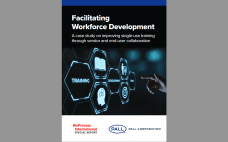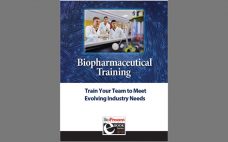Discover how Pall Corporation and Lonza collaborated to improve single-use technology training for operators using a blended approach to learning. This article presents: The importance of SUT training for operators. Why a blended approach ensures that operators get the training they need in the format that best suits their learning style. How collaboration between suppliers and biomanufacturers can shorten training program development timelines and increase the quality of training tools. How Pall and Lonza developed a digital training approach together.…
Careers
Biomanufacturing Workforce Development: Fostering Talent During and After the Pandemic
Beyond the human suffering and economic damage caused by COVID-19, one of the most powerful results of the pandemic has been to focus global attention on drug and vaccine development for infectious diseases. Massive investments by governments, institutions, and biopharmaceutical companies have accelerated development of novel therapeutics, including messenger RNA (mRNA) and viral-vector vaccines, that are poised to become transformational platform technologies for biopharmaceutical manufacturing (1). Furthermore, the well-established technology of monoclonal antibodies (MAbs) has lived up to its promise…
Defining a Successful Biotechnology Entrepreneur
Having brought its first vaccine candidates from concept to clinical development in less than three months, BioNTech is making global waves as the pioneer behind Pfizer’s COVID-19 vaccine. Because of such success stories, more eyes than ever are looking at opportunities raised by the biotechnology industry. As talented people around the world from academia, clinical practice, and other industries consider careers in this sector, they should examine the characteristics necessary to become successful biotechnology entrepreneurs. Biotechnology fuses science and business.…
The Crossroads of Academia, ​Industry, and Education: Modern Training Centers Are Pivotal to the Future of R&D
Global pharmaceutical industry research and development (R&D) investment has experienced steady growth over the past two decades, with an anticipated compound annual growth rate (CAGR) of 3.0% and projected 2024 investment of US$213 billion (1). Focused on developing innovative therapies for chronic, infectious, genetic, and lifestyle-related ailments, the fast-growing biologics segment has become a cornerstone of the pharmaceutical industry and healthcare sector. The demonstrated effectiveness and wide-ranging applicability of biopharmaceuticals also have brought considerable R&D in computational and biological technologies.…
A Framework for a Competency-Based Curriculum
Training departments in biopharmaceutical manufacturing facilities are at the forefront of ensuring that their employees are trained in accordance with regulatory compliance standards that govern the industry. More important, the purpose of training is to equip employees with relevant knowledge, skills, and abilities to perform their job functions competently. A competency-based curriculum has the potential to facilitate a training approach that addresses both the practical training needs and desired performance outcomes in a workplace. Competency-Based Curriculum Recently, I was involved…
Developing a Biopharmaceutical Workforce for Today and Tomorrow
Biomanufacturing is constantly evolving, developing new treatments and therapies through cutting-edge methodologies and facing increasing integration of big data and analytics. But keeping up with innovation in this segment requires a workforce with advanced skill sets. The US State of Rhode Island (RI), with a rich manufacturing history and a thriving biotechnology sector, has taken on that challenge. We are preparing a robust talent pool — the greater Providence area contains over 1.6 million people — to become the highly…
Launch of the First Vaccine Bioprocess Training Program: A Standardized but Flexible Course to Boost the Global Vaccine Industry
Based on the many forms that modern vaccines can take, their manufacturing is complicated. Unlike monoclonal antibodies (MAbs), vaccine manufacturers have no “template” platform to follow. Most vaccine producers develop their manufacturing processes from scratch, a prospect that can be challenging for small to mid-sized companies. Bioprocessing is the key challenge in vaccine manufacturing. Without a well-developed and understood process, a manufacturer will face serious challenges in commercial production: e.g., low yields, high costs, and difficulties in meeting quality standards.…
Innovation Leadership in Drug Development
A “sea change” in the biotechnology and pharmaceutical industries is leading established players to recruit a new type of drug-development leader. Disruptive innovators such as LG Chem Life Sciences, Google, and NestlĂ© are challenging established life-science companies to be nimbler, more creative, and more adept at applying new and emerging technologies. To spur creativity and entrepreneurship in research and development, smaller companies and Big Pharma corporations alike are recruiting leaders from different fields both inside and outside the life sciences.…
BioProcess International Conference and Exhibition 2018 Postevent Report: Key Insights, Highlights, and Take-Away Messages
From the global shift in demographics to increased efficiencies in chromatography media, change is constant within the bioprocessing industry and a major reason delegates flock to the annual BPI Conference and Exhibition. As a place to get an overview of the hot topics affecting this industry, the meeting brings together key aspects of bioprocessing — therapeutic modalities, cells, expression systems, upstream production, downstream processing, development, and manufacturing — with digital integration and the increasing importance of analytics. Add in macrobusiness…
eBook: Biopharmaceutical Training – Train Your Team to Meet Evolving Industry Needs
Welcome to this year’s focus on industry training programs. In the past three years we’ve brought this information to you in several forms: as a full supplement issue (2016), a featured report (2017) – and now this ebook. Each program that we’ve profiled offers its unique approach to training present and future biotechnologists. The best of the programs offer hands-on training with current equipment provided by supplier partners and with up-to-date approaches to documentation and regulatory requirements. Many university- and…









